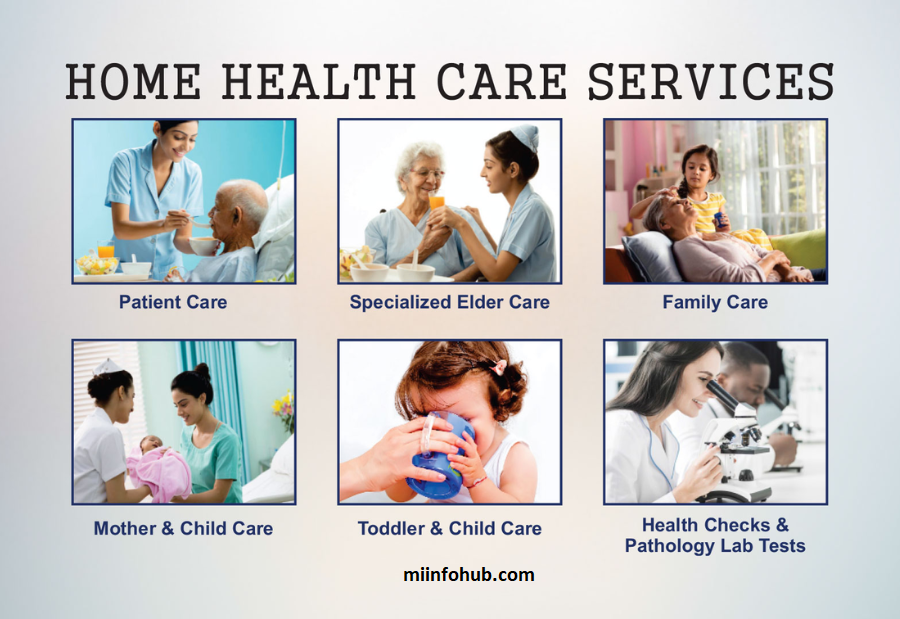What Is A Home Health Care Agency?
A home health care agency provides medical and personal care to individuals in their homes. These services help patients recover from illness, manage chronic conditions, or receive end-of-life care. Nurses, therapists, and aides visit the patient’s home to offer support. The agency ensures quality care while allowing patients to remain in a comfortable environment. It is an essential option for those who need health care but prefer staying at home instead of a hospital or facility.

Importance Of A Home Health Care Agency
A home health care agency plays a vital role in supporting patients who need care but wish to remain at home. It offers personalized medical and non-medical services, promoting comfort and independence. By providing care in a familiar environment, it reduces hospital stays and improves recovery rates. It also eases the burden on families by offering professional support. Home health care agencies ensure that patients receive proper treatment while maintaining their quality of life at home.

Why 2024 Is The Best Time To Start A Home Health Care Agency
2024 is the best time to start a home health care agency due to several key factors. The demand for in-home care is rising as the population ages, with more seniors preferring to receive care at home. Advances in technology, such as remote monitoring and telehealth, make it easier to manage and deliver high-quality care. Additionally, new healthcare policies and regulations favor in-home services, offering growth opportunities. With an increasing focus on personalized, patient-centered care, starting a home health care agency now positions you to meet these growing needs and capitalize on market trends.

Understanding The Home Health Care Industry
Understanding the home health care industry is crucial for anyone looking to enter this field. This industry provides a range of services, including medical, therapeutic, and personal care, delivered in a patient’s home. Key players include home health agencies, skilled nursing facilities, and private caregivers.
The industry is shaped by demographic trends, particularly the aging population, which drives demand for in-home care services. Additionally, technological advancements, such as telehealth and electronic health records, enhance service delivery and improve patient outcomes.
Regulatory frameworks and reimbursement policies, like Medicare and Medicaid, also play significant roles in the industry’s operation. Understanding these factors will help you navigate the complexities of starting and running a successful home health care agency. As patient preferences shift toward home-based care, comprehending this industry is vital for seizing new opportunities and providing quality care.
Legal And Regulatory Requirements For Starting
Licensing, certifications, and accreditation are essential for starting a home health care agency. Each state requires agencies to obtain a specific license to operate legally. If you plan to serve Medicare patients, you must get Medicare certification from the Centers for Medicare & Medicaid Services (CMS). Medicaid certification is also necessary for serving Medicaid beneficiaries. While accreditation is not mandatory, it can enhance your agency’s credibility. Organizations like The Joint Commission and CHAP provide accreditation options. This can improve service quality and patient trust. Regular audits ensure compliance with regulations, and implementing quality assurance programs is crucial for maintaining high standards of care.
Creating A Business Plan
Creating a business plan for your home health care agency in 2024 is essential for success. Start with an executive summary that outlines your mission and vision. Conduct a market analysis to identify industry trends and competitors. Clearly define the services you will offer, such as skilled nursing or personal care. Develop a marketing strategy to attract clients through online promotions and community outreach. Describe daily operations, including staffing and patient care protocols. Highlight your management structure and key team members’ qualifications. Include financial projections for startup costs and potential revenue. This concise plan will guide your agency toward success.
Securing Funding And Budgeting
Securing funding and budgeting for your home health care business is crucial for success. Start by assessing your startup costs, including licensing, equipment, and staffing expenses. Consider various funding sources, such as personal savings, bank loans, or investors. You may also explore government grants and programs that support health care initiatives.
Create a detailed budget that outlines both initial and ongoing expenses. Include projections for revenue based on your expected client base and service offerings. It’s essential to account for insurance costs, payroll, and marketing expenses. Establishing a financial plan helps you manage cash flow effectively and prepares you for unforeseen expenses.
Regularly review your budget and financial projections to ensure your business remains on track. By securing adequate funding and maintaining a solid budget, you can build a successful home health care agency.
Building Your Team
Building your home health care team is essential for quality care and agency success. Start by identifying key roles, such as registered nurses, home health aides, and administrative staff. Recruit qualified professionals who share your agency’s values. Use job postings and referrals to find suitable candidates, ensuring they have the necessary licenses and certifications.
Provide thorough training on patient communication, safety protocols, and compliance with regulations. Encourage ongoing professional development to keep your team updated on best practices. Foster a positive work environment that promotes teamwork and open communication. Regular team meetings can help address challenges and celebrate successes. A strong, dedicated team enhances the quality of care and improves client satisfaction.
Choosing The Right Technology And Software For Your Agency
Choosing the right technology and software for your home health care agency is crucial for efficiency. Start by assessing your needs for patient management, scheduling, and billing. Look for user-friendly electronic health record (EHR) systems to streamline documentation and improve care coordination.
Invest in scheduling software to manage staff assignments and client appointments effectively. Consider telehealth solutions to offer remote consultations. Ensure all software complies with regulations like HIPAA. Provide training to your staff to maximize benefits. Regularly evaluate software performance and stay updated with new features. The right technology can enhance efficiency and support your agency’s growth.
Marketing And Promoting
Marketing and promoting your home health care agency is vital for attracting clients. Start with a professional website that showcases your services and client testimonials. Use search engine optimization (SEO) to improve online visibility.
Engage in local events and partner with physicians to establish referral networks. Utilize social media to share health tips and agency updates. Consider targeted online advertising and email marketing to reach potential clients. Collect testimonials to build trust and credibility. A strong marketing strategy will help promote your agency and grow your client base.
Navigating State And Federal Regulations In Home Health Care
Navigating state and federal regulations in home health care is crucial for compliance. Start by understanding your state’s specific licensing and operational standards. Familiarize yourself with Medicare and Medicaid guidelines if serving those patients, including quality care and documentation requirements.
Stay updated on regulatory changes through resources from the Centers for Medicare & Medicaid Services (CMS). Train your staff to ensure they adhere to these regulations, and conduct regular audits to identify areas for improvement. By effectively managing compliance, you can provide quality care and avoid legal issues.
Scaling For Growth
Scaling your home health care agency for growth involves strategic planning. Start by evaluating your operations to identify improvement areas. Consider expanding services, like specialized care or telehealth, to attract more clients.
Invest in technology to streamline processes, such as automating scheduling and billing. Build a strong team by recruiting skilled professionals and providing ongoing training. Develop a marketing strategy to reach new clients and strengthen referral networks.
Regularly assess your financial health and adjust your budget to support growth initiatives. By implementing these strategies, you can effectively scale your agency and meet the growing demand for home health care services.
Key Tips For Long-Term Success In The Industry
Key tips for long-term success in the home health care industry include focusing on quality care, building strong relationships, and staying compliant with regulations. Prioritize patient satisfaction by consistently delivering high-quality services. Foster open communication with clients and their families to build trust and ensure their needs are met.
Invest in staff training and professional development to maintain a skilled and motivated team. Stay updated on industry trends and regulations to adapt to changes effectively.
Implement effective marketing strategies to enhance visibility and attract new clients. Regularly evaluate your agency’s performance and seek feedback for continuous improvement. By following these tips, you can ensure your agency thrives in a competitive market.
FAQs
- What are the initial steps to start a home health care agency?
Begin by researching the industry, understanding regulations, and creating a comprehensive business plan. - What licensing is required?
Licensing requirements vary by state. Typically, you need a state license and possibly Medicare and Medicaid certification. - How can I secure funding for my agency?
Consider personal savings, bank loans, government grants, and investments from private sources to secure funding. - What technology do I need for my agency?
Invest in electronic health record (EHR) systems, scheduling software, and billing solutions to enhance efficiency. - How do I find qualified staff?
Use job postings, networking, and referrals to recruit skilled professionals. Ensure they have the necessary licenses and certifications. - What marketing strategies work best for home health care agencies?
Develop a professional website, utilize SEO, engage in community events, and establish referral networks with healthcare providers. - How do I ensure compliance with regulations?
Stay informed about state and federal regulations, train your staff, and conduct regular audits to maintain compliance. - What are the common challenges in the home health care industry?
Challenges include staffing shortages, regulatory changes, and competition. Adaptability and ongoing education can help address these issues. - How can I measure the success of my agency?
Monitor key performance indicators (KPIs) like patient satisfaction, staff retention, and financial health to gauge success. - What trends should I watch in the home health care industry?
Stay updated on technological advancements, telehealth services, and changing patient demographics to stay competitive.


